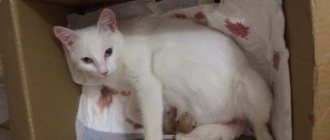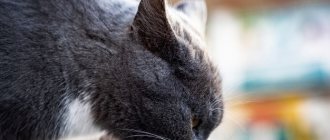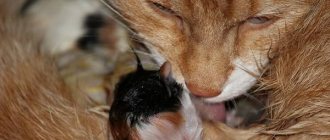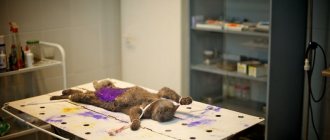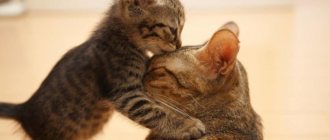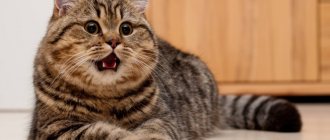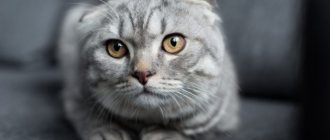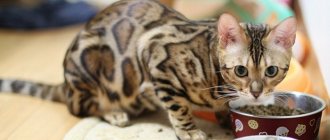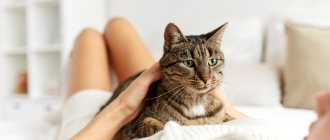Our story will touch on a topic of interest to owners of cats that will lamb in the near future.
The pet will have to take care of its offspring, and the person will have to take care of its purring mother. What to feed a cat after giving birth? The immunity, health and life of an entire cat generation depends on the actions of the owners. Immediately after giving birth, including spontaneous ones without complications, the cat is unlikely to rush to a bowl of food; it is more likely to be attracted to warm water or milk. Experienced breeders note a change in the taste preferences of their charges.
So, a cat may refuse prenatal food in favor of raw (and highly discouraged) fish and cream, which she turned up her nose at before. On the second day, insist that the pet eat - this is what determines further milk production and maintenance of strength.
Features of cat nutrition in the first days after birth
A newborn cat needs balanced and nutritious food without artificial chemical additives. The diet is selected individually and depends on the animal’s well-being. The nature of the recovery period directly depends on how exactly the birth went: whether it was natural and timely or there was a delay, a caesarean section was used, etc. If there are complications, the animal’s diet should be prepared by a doctor. During an easy birth, owners can figure out the nutritional schedule and list of suitable foods themselves, following simple rules:
- The cat should receive with food a large amount of easily digestible carbohydrates (at least 40% of the total nutritional value of food) and protein (at least 34%).
- After giving birth, the animal needs a lot of fluid, as it affects the amount of milk produced.
- Fatty foods and excess salt are prohibited. Spicy food should not be fed to any animal, either before or after birth.
- Feeding should be fractional - it is better to give food in small portions 4-5 times a day.
Food should be rich in calcium, magnesium, phosphorus, potassium, zinc, selenium, manganese, iron. The most useful vitamins for a cat and her kittens recovering from childbirth are A, D3, B1, B2, B5, C. Mom and her babies also need folic acid, taurine, beta-carotene, arginine and L-carnitine.
A cat that has given birth and is nursing should definitely refrain from hunting. If an animal goes outside, then collars with a bell will protect you from accidentally eating mice and birds.
Results
Cheap food with dyes and flavors will certainly “reflect” on the appearance of your pet. For example, the Maine Coon breed does not have any special taste preferences, and is not classified as picky.
If you give a nursing cat an economy class, goodbye to fluffy fur and shine, even to the loss of whiskers and weight loss of kittens.
Proper cat nutrition will definitely make itself felt - the kittens are not thin or restless, the nurse’s coat is not dull, and her body weight has not changed much. The ideal option is when a cat that has fattened its offspring shows on the scale its previous weight before pregnancy.
How long after giving birth should you feed your cat?
Usually, during the first 24 hours, even after a successful birth, the cat refuses food. She shouldn't be forced. The only thing she needs immediately after the babies are born is a warm drink. Starting from the second day, you need to feed the animal charmingly, since the quality and quantity of milk depends on food (and kittens suckle the cat often - every 2 hours).
Organize fractional meals at regular intervals (4–5 times a day, but with portions 3 times smaller than usual)
For the first week, the feeding of a nursing female should consist only of easily digestible, nutritious and natural foods - these can be low-fat milk and fermented milk products, vegetables, and cereals. You should abstain from meat for now, but if the cat really asks, then you can give a little low-fat meat broth. From day 7, “usual” foods are gradually introduced into the diet, including boiled meat and fish. If there were no complications during the postpartum period, by the third week the cat will recover and go back to its usual food.
Is it safe for a cat to eat afterbirth?
In the womb, kittens “live” in a special sac called the placenta or afterbirth. During childbirth, this sac comes out with the baby, and the cat often eats the membrane. There is nothing dangerous about this. The animal does this intuitively for reasons of safety (in the wild, animals thus destroy the smell of blood that attracts predators), as well as in order to provide itself with vitamins and nutrients, which the afterbirth is rich in.
However, there is an opinion that for a domestic cat to eat all the afterbirth means to incur stomach problems. Therefore, it is not recommended to allow a young mother to eat more than 1-2 afterbirths.
List of the most useful foods for a cat who has given birth
In the first weeks after the birth of kittens, a cat who has given birth experiences a deficiency of vitamins and minerals, since most of them “go” into the milk. Constant lactation leads to greater consumption of water and proteins. The owners' task is to provide the animal with food that will fill the gap in these substances. The basis of the diet should be:
- low-fat meat broth;
- fermented milk products;
- boiled meat, thoroughly chopped and slightly softened with broth.
The presence of coarse fibers and fiber in a cat’s diet plays an important role in restoring the functioning of the digestive system. They are present in cereals and vegetables. Some cats happily eat grass and fruits (for example, watermelons, melons) - after giving birth, it is better to refrain from such treats, as they can provoke an allergic reaction in kittens.
Prohibited Products
Cats should not be given raw meat. It is difficult for digestion (and after childbirth, the digestive tract works in a slower mode, so the risk of constipation is high). It is necessary to exclude large amounts of salt from getting into the milk (as it impairs the absorption of calcium and leads to a slowdown in the development of the kittens’ skeletal system) - you should not treat the mother who has given birth to cheese, sausages, sausages and other salty foods.
If you notice that certain foods cause diarrhea, you should stop giving them to your cat. After childbirth, the female’s body is already dehydrated, and diarrhea will lead to even greater loss of water, which is fraught with complications.
When can you give your cat dry food that she ate before giving birth?
The biscuits that the cat ate before pregnancy can be given to the animal again only after lactation has stopped. This usually occurs 4–7 weeks after birth. In the first week of returning to dry food, it should be slightly moistened with broth, since there is a possibility that the cat’s body has not yet fully restored the functioning of the digestive tract. It’s a different matter with food that was originally intended for giving birth and lactating animals. They can be given to the female 1–2 weeks after giving birth. without waiting for the end of lactation.
Royal Canin QUEEN PRO is a premium food that can be given to a cat after giving birth
Diet details
Be sure to include boiled meat, cut into fibers, minced meat and mixed with broth. Industrial baby meat food is perfect for children. In addition, for the functioning of the digestive and excretory systems, fiber and coarse fibers are required, which are sufficient in vegetables and plant crops. Some cats will like grass, lettuce, and melon-type fruits. But it is better to refrain from such experiments - kittens may suffer from allergies. Gradually, boiled chicken eggs and offal are added to the natural diet.
To make milk, add lactation-stimulating anise, oregano, and lemon balm to the liquid food. Their quantity in the form of decoctions (from 1 tsp of herbs and 0.5 liters of boiling water) of low concentration (cats have a keen sense of smell) should not exceed 1-2 tsp. per day.
The first week of lambing is shown without meat ingredients, but some cats only eat them, so broth and lean meat are offered. The forum about cats describes the convenience of preparing half soup, half porridge, consisting of broth (fish, chicken, etc.) and boiled cereal without salt. Animals that had an easier time of birth recover in a similar way, and after 20 days they return to their previous lifestyle and diet.
If before birth the cat's food consisted of dry food, there is no point in switching her to natural food. Thanks to modern production and requirements, there are lines of food created specifically for nursing animals and their babies that meet the most stringent criteria. The composition is balanced for milk production and includes all necessary types of substances - from proteins to minerals, from calcium to anti-inflammatory components.
At the same time, the special food contains no dyes, preservatives, chemical fillers or preservatives. Food brands do not need advertising; they are all premium, super premium and holistic. There are even pedigree ones among them. For example, food with a high calcium content is necessary for Scottish breed kittens, since this element contributes to the folding of the ear. Feeding with dry granules is allowed already 6-8 days after lambing.
Many owners are worried: if a cat ate dry food before giving birth, when can it be given? Experts believe that after the end of the lactation period, a month or two later, based on the lambing date, the first time dry food from the category “nursing mothers” is soaked in liquid (broth or milk). This is necessary to restore the functions of the digestive tract.
It is also recommended to replace dry food with wet food due to the sufficient amount of liquid in the latter form.
Ready-made food suitable for postpartum cats
| Name | Form | Compound | Peculiarities | approximate price |
| Royal Canin Queen 34 PRO | Dry |
| Can be used throughout pregnancy and until the end of lactation. |
|
| ProPlan Junior |
| Suitable for kittens, pregnant and lactating cats. After birth, food can be given from the second week (soaked in water or broth). |
| |
| Royal Canin Mother & Baby cat | Dry food, canned food | Dry:
Canned food:
| Can be given to cats in a soaked form from the second week after birth, suitable for starting complementary feeding for kittens. |
|
| BOZITA Funktion Kitten | Dry |
| Suitable for kittens, pregnant and lactating cats (from the second week after birth). |
|
| Eukanuba Kitten Healthy Start |
| Primarily intended for kittens, but suitable for feeding cats from the third week after birth. |
|
Royal Canin Mother & Babycat canned food is suitable for both kittens and cats from the second week after birth
Rule three. Include vitamins in your pregnant cat's diet
What vitamins should I give my cat? Here we are talking about vitamins for a pregnant cat. A pregnant cat should be given kitten vitamins.
Vitamins for cats are available in the form of tablets and pastes. Which form of vitamin preparation to choose depends on your cat’s wishes. Some enjoy eating tablet vitamins, while others do not like to bite into the hard substance.
I buy my cats Unitabs vitamins for pregnant and lactating cats. If the cat does not chew the tablet, then I crush it and add it to the food.
The vitamin and mineral complex Unitabs / Unitabs Mama+Kitty with vitamin B9 for kittens, pregnant and lactating cats was developed by leading scientists of the German laboratory Neoterica.
Compound:
skimmed milk powder 81.5%, mineral premix 5%, vitamin premix 3%, gelatin 3%, taurine 1%, Aerosil A 1%, calcium stearate 0.5%.
1 gram of supplement contains:
B9 (folic acid) 23.12 mcg, vitamin A (retinol acetate) 64.2 IU, B1 (thiamine) 165.0 mcg, B2 (riboflavin) 143.8 mcg, B5 (pantothenic acid) 196.0 mcg , B6 (pyridoxine) 78.4 mcg, PP (nicotinamide) 1.23 mcg, Sun, H (biotin) 40.9 mcg, Ca-calcium 8.44 mg, P-phosphorus 6.44 mg, Mg-magnesium 3 .3 mg, Fe-iron 1.9 mg, Cu-copper 0.13 mg, Zn-zinc 1.6 mg, Mn-manganese 0.12 mg, J-iodine 0.028 mg.
Application:
1 tablet per 1 kg. animal weight
Vitamins for cats Unitabs / Unitabs Mama+Kitty are also available in the form of a paste. If your cat is picky about tablets, she will not refuse the paste. My cats happily lick the toothpaste straight from the tube.
Unitabs vitamin and mineral paste for Kittens and pregnant and lactating cats contains catnip, so even picky cats will like it.
- Contains 14 elements for growth and development;
- supports proper metabolism;
- replenishes the balance of vitamins, macro- and microelements;
- strengthens the immune system and reduces the risk of disease;
- improves the composition and secretion of milk;
- used to enrich the diet during natural feeding;
- as an additional source of vitamins when feeding industrial feeds
During a cat's pregnancy, there is an increased consumption of calcium to build the skeletons of the future offspring, so it is necessary to introduce vitamin and mineral supplements with a high calcium content into the cat's diet. The choice of such drugs is quite large.
Feed additive Beafar for Dogs and Cats with high calcium content
Irish Cal feed additive is intended for kittens, pregnant and lactating cats to enrich and balance diets with minerals, in order to prevent diseases such as rickets, anemia, and weakening of bone tissue.
Compound:
minerals, inactivated yeast 4%, calcium hydrogen phosphate 82.7%, calcium carbonate 8%, calcium lactate pentahydrate 4%, magnesium oxide 1.3%. Analysis: protein 1.9%, fat 0.3%, fiber 0.12%, ash 66.2%, moisture 13.6%, calcium 23%, magnesium 0.8%, phosphorus 15%. Additives per 1 kg: vitamins B1 1.8 mg, B2 1.2 mg, B3 36 mg, B4 248 mg, B5 0.7 mg, B6 0.99 mg, preservatives
Good balanced nutrition for a cat during pregnancy is the key to healthy offspring.
Share with your friends!
Reviews of food for nursing cats
Bozita did not suit us. The mother in labor willingly ate it, but the kittens began to have severe diarrhea from this food.
dellaros
https://foren.germany.ru/arch/animals/f/26404016.html
I fed my cat Royal Canin Queen 34 food at the end of pregnancy and throughout the entire period of feeding the kittens. The kittens' father also lived with us and also ate these crackers. They ate the food without any problems - there was no need to persuade. In two months, the cats became noticeably prettier, growing a belly, cheeks and a luxurious fur coat.
Selenia_6
https://irecommend.ru/content/kot-vyros-kak-na-drozhzhakh-koshka-mama-pokhudela
I adopted a cat from the street, and she turned out to be pregnant (and gave birth to kittens a week and a half ago). The veterinarian advised feeding her Pro Plan Junior food. Packs of 400 grams were enough for my new pet for a maximum of a week. The food is presented in the form of flattened small balls. The cat liked the taste immediately - she just pounced on the food. I couldn’t pour it into a bowl on the floor, I always had to take it in one hand and pour the food with the other, because otherwise the cat’s head would end up in the bag. The stool of both cats and her kittens is always in order, the fur has become much smoother, everything is fine with health.
Polina_Krukovskaya
https://irecommend.ru/content/khoroshii-korm-po-krainei-mere-menya-poka-ustraivaet
Rule one. Folic acid is important for a pregnant cat
In the first three weeks of pregnancy, the formation of the embryo occurs, and all the vital organs of the future kitten are formed. During this period it is important
introduce folic acid into the diet. It has been scientifically proven that folic acid (or vitamin B-9) is indicated for pregnant women. Cats are no exception. The physiological mechanism of folic acid lies in the direct action of vitamin B-9, which carries out active adhesion of the sperm to the egg and its attachment to the wall of the uterus. Reliable fastening is a reliable support that ensures normal nutrition of the cell and thus the normal development of the fetus. Therefore, before planning a mating, the veterinarian recommends giving the cat 1/4 tablet of folic acid once a day for about 5 days. I usually give a whole tablet, because... all excess vitamin B9 is excreted in the urine and no side effects from an overdose of the drug were observed. If you find recommendations not to change your cat's diet in the first three weeks of pregnancy, this is not entirely correct. Remember that folic acid should be given before mating and during the first month of pregnancy, because Most cats are deficient in this vitamin. You can buy this drug at any pharmacy.
What products help solve the problem of insufficient lactation in cats?
If your cat produces very little milk, you can stimulate production by adjusting the diet. Start giving your animal more fluids (problems with lactation often occur due to dehydration).
A bowl of water or milk should be kept near the nest, as sometimes the female would rather be thirsty than leave her babies
Try to give your cat more fermented milk products - low-fat kefir, sour cream, yogurt without additives. Carrots and boiled pumpkin are useful, which can be given to the animal along with meat broth. Walnuts have a milk-containing effect - just grind 2-3 kernels in a blender to a powder and add them to warm milk. If the cat refuses to drink this medicine, you can pour it into her mouth using a syringe without a needle. Lactation is also stimulated by quail egg shells and oat sprouts. As with nuts, they must first be crushed and then mixed with milk.
Proper nutrition after birth will allow the cat to quickly recover (gain weight, return to its former activity). It is also important to monitor the diet because the quantity and quality of milk secreted by the female depends on food. On the first day, you should feed your cat broths and fermented milk products, then you can add a little meat or switch to special ready-made food intended for lactating animals.
How to use store-bought feed
In an “interesting” situation, it is better to switch the expectant mother from regular food to specialized food! And since not all manufacturers produce this, you should focus on the super-premium class, for example, “Acana” or “Bozita”, or... for kittens, which have everything that is needed for the development of the fetus.
By the way! A cat accustomed to baby food during the gestation period (starting from the 4th week), then the babies will eat the same without problems.
For variety, alternate between dry and wet foods. Specially created food for pregnant women does not need to be supplemented with anything.
Remember! Adaptation of the pet’s gastrointestinal tract to the new diet should be gradual.
Nutrition of the lop-eared mother
The right food for a future Scottish mother, in addition to a complex of minerals, should contain a sufficient amount of protein, taurine, rough fiber and fatty acids (Omega3, Omega6). In order to have milk, it is recommended to introduce weak meat broths, milk or fermented milk products into the diet and provide free access to fresh water.
So what exactly can you feed after childbirth? After all, it is so important to provide for such nuances as:
- so that there is milk;
- proper nutrition;
- satiety of mother and cubs;
- normal functioning of the gastrointestinal tract.
Feeding by trimester
Conventionally, pregnancy in a cat is divided into three time periods or trimesters, each of which has its own rules and feeding features.
First trimester
During the first trimester, embryos are still quite small, and external signs of pregnancy are not obvious. However, due to the fact that hormonal changes in the mother’s body have already begun, the owner in any case has to adapt to her increasing appetite. It is important not to overfeed the cat, since excess food will lead to obesity, which can only complicate the birth process.
By the way! It is worth noting that a clear increase in interest in food is not observed in all pets in the early stages. Some animals, on the contrary, exhibit an aversion to food. Therefore, when calculating portions, it is important to take into account the current condition of the pet.
During the first trimester, the amount of food increased by ten percent
It is generally accepted to increase the diet by a tenth of the previous amount of food. An increase in food consumption occurs due to increased frequency of meals. If previously the cat fed 2-3 times a day, now it should be fed at least 4-5 times. This will satisfy your cat's hunger without overloading its digestive system.
Second trimester
The second trimester begins on the twentieth day and is marked by a repeated increase in the food the cat eats. Embryos increase in size and require more nutrients, which is clearly felt by the pet. During the second trimester, the animal consumes twice as much food compared to its diet before pregnancy.
The second trimester takes away a large amount of nutritional resources from the cat, which it replenishes through food.
Third trimester
The second half of the final month of pregnancy is accompanied by a gradual decrease in appetite, which occurs for several reasons:
- the embryos begin to put pressure on the pet’s stomach, which is often in an irritated state;
- kittens no longer need the same amount of food for intensive growth, completing their intrauterine development;
- The animal’s body instinctively begins preparing for childbirth and gets rid of all kinds of extra calories.
Therefore, if at this moment you notice how your cat is losing interest in food, do not worry about its health - in most cases, this condition is completely natural.
The third trimester is accompanied by the completion of fetal development and a decrease in their need for food
A few weeks before giving birth, the number of meals is increased even more, up to six times a day, in order to reduce the amount of food in the portions themselves. The total amount of feed consumed per day remains unchanged.
A week before giving birth, the cat returns to the same volumes of food that she had before pregnancy, and the frequency of feedings is reduced to three times a day. The animal’s intestines are gradually unloading, preparing for an important date, therefore, as it approaches the birth, the pet will approach the bowl of food less and less often.
As the birth approaches, the cat loses interest in food
Prohibited foods for mother cats
It must be remembered that raw natural products cause helminthiasis not only in the cat, but also in her babies. The daily menu should not include:
- raw pork, beef and fish;
- raw eggs;
- salted cheese;
- foods that cause indigestion - liver, milk (if you have lactose intolerance);
- spices. If a person prepares food for himself, he must flavor it with spices. It is not recommended to give such dishes to a cat, i.e. food for your pet must be prepared separately;
- Sugar, sweets, cookies, buns contribute to the development of constipation in the pet and her heirs, so it is prohibited to treat your cat with sweets.
Feeding tips
Among the “food” tips that will make it easier for a cat to endure pregnancy, we list the main ones:
- Since cats sometimes have problems with bowel movements during pregnancy, they are recommended to be given vegetable meat or low-fat meat broths. Some owners pour milk into their cats to treat constipation, but in adults this product causes indigestion and diarrhea, which, although it overcomes the disease, does not do so in the most pleasant way;
- a couple of weeks before giving birth, cats are recommended to make a special decoction of nettles - this drink helps improve lactation;
The decoction can be given to cats not only during pregnancy, but also while feeding kittens.
- Some cat lovers recommend giving your cat a decoction based on raspberries, since this berry can facilitate the process of childbirth and subsequent recovery. “Research” has not been conducted to confirm this statement, so the exact connection between raspberries and childbirth is unknown.

